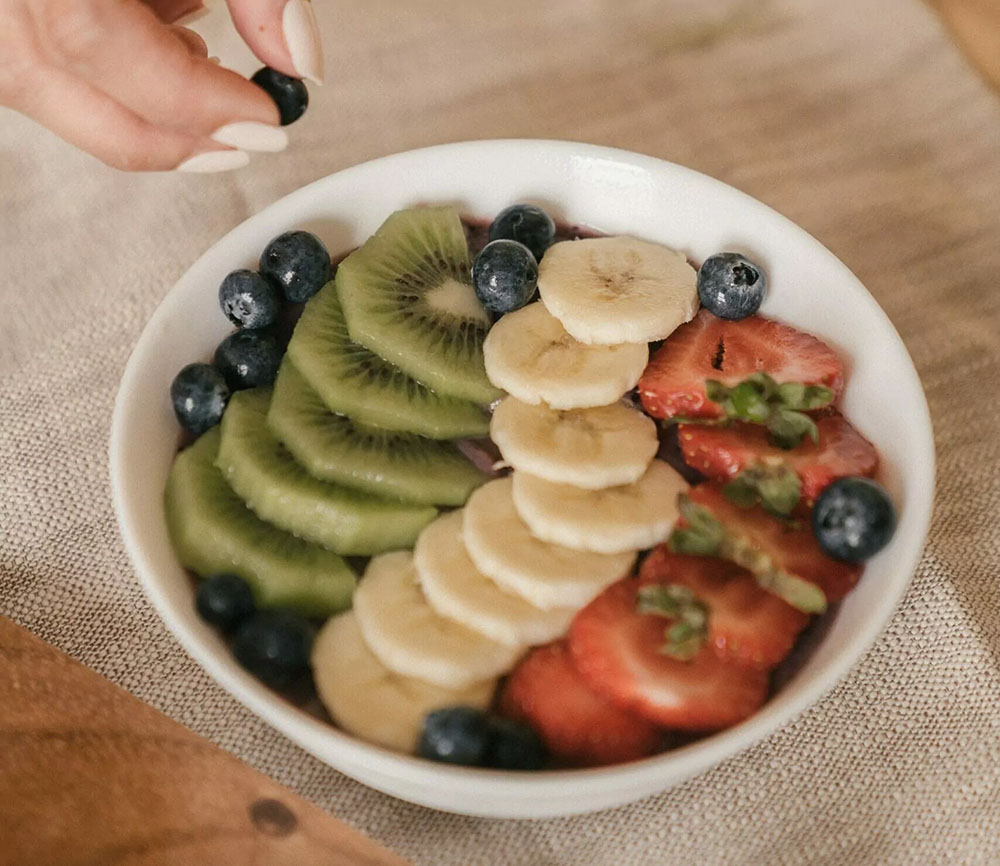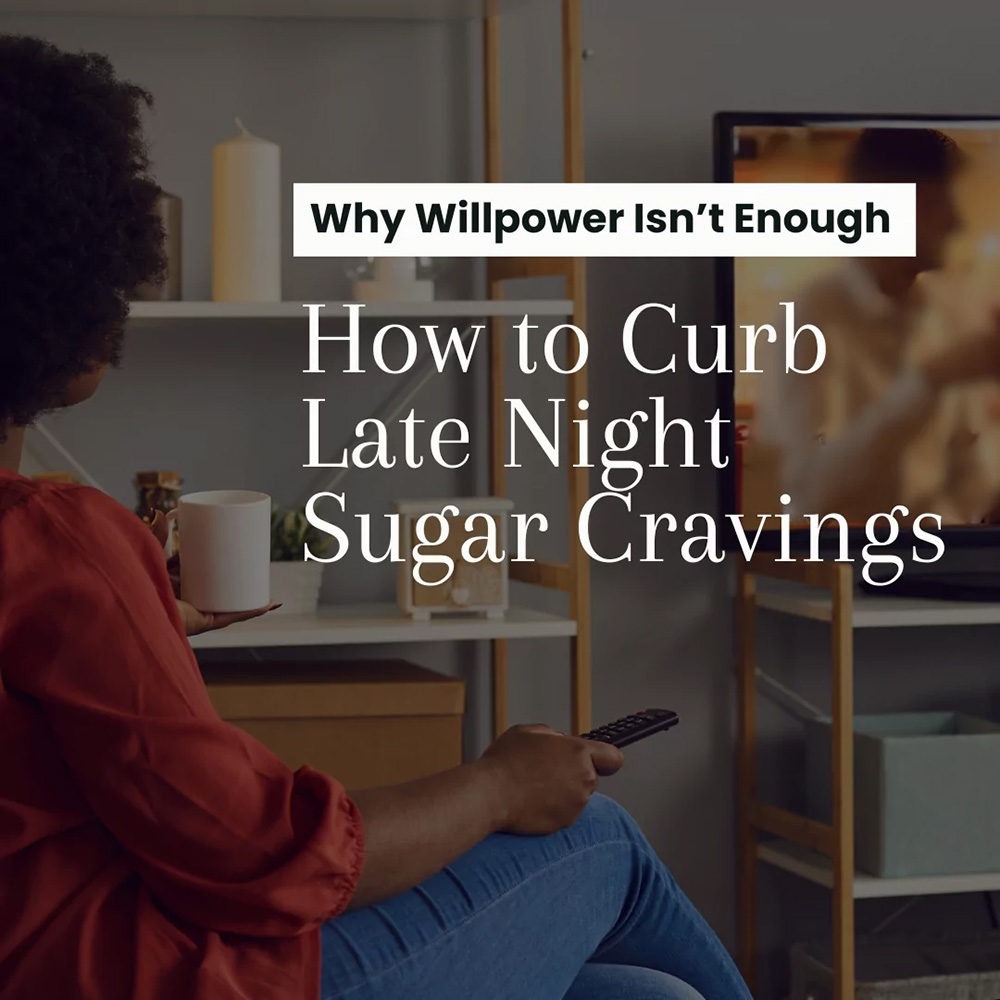One of the most common struggles my 1:1 coaching clients face is the late-night sugar craving.
Picture this: You’ve finally wrapped up your day and you’re ready to unwind. But you don’t want to go straight to bed — you haven’t had any time to just relax! This is your only opportunity to read, catch up on your latest Netflix series, or spend some time with your partner. And at this point, when you’re tired and in the mood to cut yourself a break, it’s hard to resist when that little light starts flashing CHOCOLATE through your brain.
(Or maybe for you, it’s wine, chips, or cookies. We all have our kryptonite.)
Why Do We Crave Sugar at Night?
Sugar cravings are a common experience for many people, making it difficult to maintain healthy eating habits and contributing to a host of health challenges – you’re likely aware of them: unwanted weight gain, energy fluctuation and the exacerbation of chronic diseases, etc.
For people attempting to lose weight or simply maintain a balanced diet, I’ve seen that understanding the science behind these cravings and employing strategies to manage them can be enormously beneficial.
There’s more to these cravings than just a sweet tooth. Let’s break it down:
At a physiological level, your body is craving energy. At a mental level, you’re probably craving a hit of dopamine, the feel-good hormone that’s released when we experience something pleasurable. So it’s no big surprise that these cravings tend to surface late at night.
1.Your Body’s Energy SOS
Physiologically, your body is sending out an energy distress signal. Mentally, you’re probably chasing a hit of dopamine, that feel-good hormone released when we experience pleasure.
2. The Post-Dinner Slump
It’s typically been a few hours since dinner, and if that meal was high in refined carbs, you’re likely coming down from an energy high. Your brain’s solution?
Another quick boost.
3. Daily Fatigue Factor
Sometimes, it’s simply that you’re exhausted from the day, and your body is signaling for something. It probably needs sleep, but sugar seems like a quicker fix.
4. Stress: The Sugar Magnifier
Stress can also influence sugar cravings.
When we’re stressed, we want a quick hit of energy to help power us through the situation, and we want those feel-good hormones that flood the body and make us feel better.
5. The Reward Mentality
There’s also a willpower component: your willpower declines over the course of the day. If you feel like you’ve been ‘good’ all day and deserve a treat, night-time sugar cravings can create a perfect storm of temptation and indulgence.
And here’s the kicker: sugar begets more sugar. The more sugar you eat, the more you want. It’s a cycle that can quickly spiral, especially during holidays or when you’re out of your normal routine.
That’s why cravings often really rev up around the holidays, when you’re on vacation or out of your normal routine: if you have a few indulgences a few days in a row, your body adjusts to that increased energy level, and will trigger a craving when it’s not getting that high input.
How to Break the Late-Night Sugar Cycle
Trust me, I’ve been there. Not just personally, but I’ve now helped hundreds of clients get a handle on their sugar intake. It’s a journey, and sometimes a challenging one, but it’s absolutely achievable.
In my 10+ years working as a nutrition and weight loss coach, I’ve seen people transform their relationship with sugar, from feeling controlled by cravings to feeling in control of their choices. And let me tell you, that transformation is powerful.
Through years of working with clients, I’ve gathered some of the most effective strategies for tackling sugar cravings. These aren’t just theories from a textbook – these are battle-tested techniques that have worked for real people, just like you.
So, let’s dive into some of the best strategies I’ve seen work time and time again:
1. Look at & Audit What You Eat in a Day
To break the sugar cycle, it’s important to start by looking at what you are usually eating in a day.
Take a hard look at what you’re eating throughout the day. Are there hidden sugars lurking in your meals?
For example, if you’re eating breakfast cereal, how much sugar is in the cereal? Could you get the same sensation of fullness and satisfaction from a cereal with a lower sugar content, or could you experiment with a different type of breakfast?
Common culprits are fruit juice, toast, dried fruit — all these can contribute to a higher sugar intake than is really necessary and are often really easy to swap out for a healthier alternative.
2. Embrace Gradual Change
If you’re looking to cut down on your night time sugar intake, it’s important to recognize that you may have been eating this way for a while so it’s going to be much harder to change long-term if you just go to nothing.
Remember, you’re not just fighting a habit – you’re up against your own physiology.
Quitting cold turkey rarely works long-term.
Instead, aim for small, sustainable changes over time.
3. Remember: Don’t Demonize All Sugar
Some of my clients used to worry and think that they shouldn’t eat fruit because “there’s too much sugar in fruits”. They assumed I’ll say no to mangos, apples or berries. Good news: you don’t have to cut out all the sugar! And fruits are not the problem.
Fruits, with their fiber and nutrients, aren’t the enemy.
Focus on reducing unnecessary added sugars instead.
For example, you could add less sugar to your coffee in the morning, or switch from muffins and cereal to protein oats or pancakes.
Remember, too, that there are so many brands out there now that offer healthier options of snacks you already love (those natural peanut butter and dark chocolate squares are a personal fav).
Start small and over time, you’ll start to notice that things seem sweeter, and so you need less of it to get the same satisfaction.
You don’t have to get this perfect. The goal is just to get better. It’s not about restricting or cutting things out completely — just finding a better choice to support your goals and priorities.
4. Practice Mindfulness
A big part of managing sugar cravings at night comes down to mindfulness.
When you notice a craving, give yourself just a second to examine it. Are you actually hungry? Would a healthier snack tide you over? Do you actually even want the thing you’re craving when you think about it consciously?
Often that pause is enough to shake you out of the grip of your sugar craving. You can also try a few other small interventions to slow yourself down and make a mindful decision: have a glass of water. Do a few stretches. Move to another room. Does the craving go away? Does the shift in what you’re doing take the edge off?
Keep an eye on what does and doesn’t make a difference. Over time, you’ll build up your ability to notice a craving without acting on it, and the less sugar you snack on, the less cravings you’ll have.

Why it’s Best to be Purposeful With Your Chosen Treats
I want to make one more important note here about sugar and snacking.
Life is made better by the occasional treat. I understand this and live by this attitude myself. I have indulgences every now and then, and don’t restrict myself if there’s a special occasion.
I’m just mindful about how I do it, paying attention to my body and try my best to make each decision intentionally.
That’s why I ask my clients what their non-negotiables are. If you go to your mom’s house for dinner every week and she is always going to make pasta and a pie that you will 100% consume, that’s fine — we will factor that in and work around it.
Or if you love wine and know you’re never going to give it up, that’s fine — we will factor it in and work around it.
Just know what your chosen indulgences are and treat them that way.
Our society is so advanced right now that any ‘treat’ is available at the snap of your fingers, and that’s the bigger battle.
The problem is not the treats themselves. The problem happens when we start eating treats all the time, and without really thinking about it, instead of saving them for special occasions or when we’ve specifically planned for it.
The problem happens when the treats become a habit, and become part of your diet.
Let’s face it: if you feel like you need that 3pm scone every day just to be able to cope with work, it’s not a treat… it’s a crutch. And it’s a crutch that becomes a significant part of your diet — that daily scone means about 300 scones a year.
In that situation, it’s more helpful to take a step back and ask broader questions that might uncover the root cause of the craving.
Why do you feel such a strong need for that scone? What’s going on in your environment that prompts your afternoon sugar break? What’s drawing you to this habitual treat?
Again, it comes back to mindfulness.
Getting rid of sugar cravings at night — or any time — comes back to really understanding what’s motivating you to make better choices about your food, and giving yourself the chance to change course when a craving does come along.
It’s about understanding what triggers your cravings, and setting yourself up so that those triggers don’t happen so often.
It’s also about giving yourself some grace, and accepting that it’s a practice that’s going to take some time, and aiming for better, not perfect.
I’m here to support you in this process. If you’d like to explore accountability and habit change coaching to beat your sugar cravings so you can stay on track to reach your goals, click here to book in a call with me .




